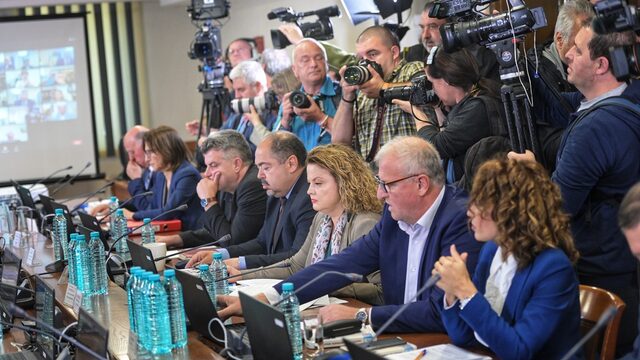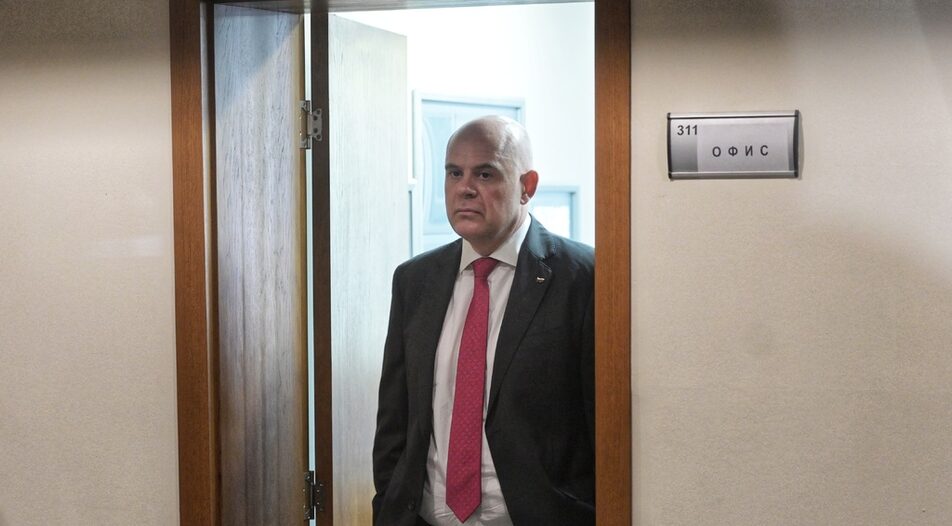After two years of ignoring much more scandalous acts and statements by the Prosecutor General Ivan Geshev, on Monday evening the Supreme Judicial Council (SJC) voted for the early termination of his mandate for "undermining the prestige of the judiciary". The decision relates to Geshev's statement demanding the removal of "political trash" from Parliament during a press conference in May.
The decision was passed with 16 votes "for" his removal and four "against" after only two days of discussions in the SJC and in the absence of Mr Geshev, who departed early to a hearing of the rule of law committee (LIBE) of the European Parliament in Strasbourg where he will likely make a last stand and probably attack his opponents - at a European level.
The SJC has previously dragged two previous attempts for Mr Geshev's dismissal, filed by two former Justice Ministers and on more serious allegations, for several months, before ultimately dismissing them. This indicates that the supreme organ of independent governance of the judiciary in the country is completely dependent on the whims of politicians and especially those from MRF and GERB, which suddenly and abruptly changed their attitude towards the outgoing Prosecutor General just a month ago.
What happened?
The decision was taken in the framework of the procedure initiated by the proposal of four members of the prosecutors' collegium on 22 May about Mr Geshev's statement that "political trash" should be removed from the National Assembly. Geshev made this comment during a press conference on 15 May in which he also theatrically tore up his resignation letter in response to calls from Mariya Gabriel, who was GERB's nominee for PM at the time.
The SJC's assessment is that Ivan Geshev's behavior has undermined the prestige of the judiciary, but many of its members put this behavior in the context of Geshev's overall presence in the public arena.
Is Geshev gone for good? Not just yet
Monday's decision, however, does not end Mr Geshev's term as prosecutor general, which will happen only after President Rumen Radev signs the decree for his removal. According to the constitution, the president has no deadline for signing the decree, and there have already been comments in the public space by people close to Mr Radev that he should not do so until a Constitutional Court ruling.
The Court has to rule on the case, initiated at Mr Geshev's request from last week against the changes in the judicial law made by ex-caretaker Justice Minister Krum Zarkov, which reduced the majority for removing the prosecutor general from 17 to 13 votes. At the same time, the SJC currently has a reduced composition of 22 members instead of 25, in constitutional terms, because three seats are vacant.
This marks the beginning of the crisis in the judiciary, not the end
It seems that the crisis around the Prosecutor General and the SJC is not coming to an end - on the contrary this is just the start. While Mr Geshev remains in office until the president's decree, he would likely continue using all tools at his disposal to fight back. As already mentioned, he's currently attending a European Parliament closed committee hearing, which he promised would be "interesting" during the Monday SJC council. Last week, he also asked to be heard by the National Assembly on specific cases of public importance about high-level corruption and influence peddling. On top of everything, he promised to deliver an address to the nation very soon.

Recently he has been furiously proactive (or even hyperactive) in demanding MPs' immunity from investigation - currently, there are six MPs, including two ex-PMs, Boyko Borissov and Kiril Petkov - that the Prosecutor General wants to investigate. At the same time, the demand for immunities comes at a difficult moment for the new non-coalition between GERB and WCC-DB. Neither party would like fresh rifts at the very start of their rotational government over matters such as the so-called "Barcelonagate" investigation of Mr Borissov.
In the meantime, President Rumen Radev is also due to take a decision on the SJC's proposal for early termination of the prosecutor general's mandate, which the council will send to him immediately. A potential refusal to sign the decree could trigger another political crisis. The president has another option - to return to the SJC the proposal to dismiss Mr Geshev, giving reasons why he wants it reviewed. This can be done only once, and if the plenum confirms its decision and votes again to remove Mr Geshev, Mr Radev is obliged to sign the decree of dismissal.
Only when Radev signs the decree can the SJC proceed to appoint an acting Prosecutor General who will hold the post until a replacement is chosen. But this promises to be an uphill battle too because the current SJC has an expired mandate and, more importantly, has been sufficiently discredited by its actions vis-a-vis Mr Geshev ever since he was selected three years ago.
And don't forget that there is always the risk that a new Prosecutor General who is convenient for the status quo powers might be selected on the crest of the new attempt for a judicial reform that MRF and GERB are now riding.
After two years of ignoring much more scandalous acts and statements by the Prosecutor General Ivan Geshev, on Monday evening the Supreme Judicial Council (SJC) voted for the early termination of his mandate for "undermining the prestige of the judiciary". The decision relates to Geshev's statement demanding the removal of "political trash" from Parliament during a press conference in May.
The decision was passed with 16 votes "for" his removal and four "against" after only two days of discussions in the SJC and in the absence of Mr Geshev, who departed early to a hearing of the rule of law committee (LIBE) of the European Parliament in Strasbourg where he will likely make a last stand and probably attack his opponents - at a European level.












